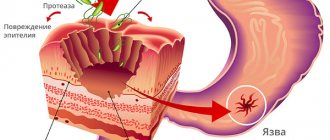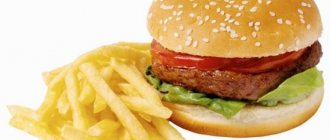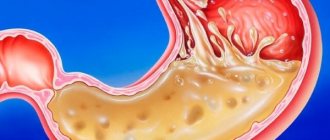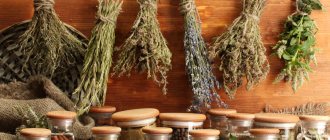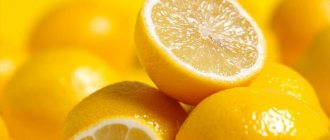What is gastric acidity?
Gastric juice is acidic due to the content of hydrochloric acid. Such an aggressive environment in the stomach is necessary to neutralize many bacteria and viruses that enter the body with food, as well as for effective digestion.
Increased stomach acidity occurs when the secretory function of the stomach increases
When the stomach is empty, it contains some gastric juice. During a meal, increased secretion begins, and the amount of juice produced can reach 1.5 liters per meal. Normally, the acidity of gastric juice is 1.5-2.5 on the pH scale. That is, the environment in the stomach is highly acidic. Everything below a value of 7 (neutral) is considered acidic, and everything above seven is considered alkaline.
Symptoms of high stomach acidity
Increased stomach acidity occurs when the secretory function of the stomach increases. The most common symptom of high stomach acid is heartburn. In this case, sour belching may also be added to heartburn.
Hunger pain can also be one of the symptoms of high acidity. Another symptom of high levels of hydrochloric acid in the stomach may be stomach upset. In this case, the patient has problems with stool, that is, diarrhea or constipation occurs, heaviness in the stomach or bloating is felt.
Diseases accompanied by high acidity are treated with antacid and/or antisecretory drugs. However, antacids should in no case be considered as primary drugs, but only as symptomatic ones. Recently, drugs based on proton pump inhibitors have been increasingly used to neutralize hydrochloric acid production.
Side effects of medicinal plants
Various herbs , due to the characteristics of their composition, can have a positive effect on a certain symptom of the disease and, at the same time, have a negative effect on other symptoms.
Therefore, it is necessary to approach the treatment of a pathological condition of the body with caution, taking into account all the available properties of this plant. Some herbs contain substances that can accumulate in the body, such as cardiac glycosides. If you take decoctions or infusions uncontrolled, they will have a negative effect on the heart muscle. Long-term use of medicinal herbs that can reduce the acidity of gastric secretions can lead to the development of iron deficiency anemia with all the accompanying symptoms.
Side effects of some plants used in herbal medicine:
- wormwood is a bitterness, a decoction of which is used to stimulate appetite, but in overdose it has the ability to cause convulsive muscle contraction. Having this property, wormwood is contraindicated for pregnant women;
- yarrow – has the property of causing hypotension;
- St. John's wort - uncontrolled use of herbal remedies can cause increased blood pressure.
Important! Start treatment with traditional medicine recipes only after the recommendation of a specialist and in the absence of allergic reactions of the body.
Causes of increased acidity in the stomach
Increased acid production can occur for various reasons, for example, alcohol abuse, smoking with gastritis, addiction to “fast food”, spicy and fried foods, increased nervous excitability, stress.
The process can be triggered by inflammatory diseases (damage to the bile ducts, intestinal diseases), which irritate the gastric glands and cause “unauthorized” production of hydrochloric acid. Intoxication of the body, which occurs during infectious diseases and stimulates the gastrointestinal tract, also plays an important role.
Often, high acidity is accompanied by chronic gastritis with secretory insufficiency, pancreatitis, intestinal infection, and liver disease. The main symptoms are heartburn, burning sensation in the esophagus and stomach, loss of appetite, constipation, vomiting. They may appear (or intensify) after eating spicy foods and seasonings, garlic, fried foods, confectionery, and chocolate. At the same time, even one cup of too sweet tea can cause discomfort.
Hydrochloric acid in high concentrations damages and corrodes the walls of the stomach. At first, eating food reduces pain, while at a later stage, filling the stomach, on the contrary, causes pain. If the underlying disease is not treated, erosive gastritis and ulcers may occur.
Herbs to combat symptoms of pathology
Chronic gastritis is often accompanied by periods of exacerbations. At this time, medicinal herbs and mixtures selected taking into account the most unpleasant symptoms will help.
Plants that best relieve inflammation
Herbal remedies that relieve inflammation are especially effective in the treatment of gastritis with high acidity. After all, atrophic, catarrhal, erosive types of pathology are often accompanied by the appearance of ulcers and require emergency relief of symptoms. The most effective herbs:
- sage, medicinal clover;
- blue cornflower;
- horsetail;
- chamomile, coltsfoot;
- thyme;
- alder fruit;
- linden, licorice, calendula;
- fireweed, thyme;
- Kalanchoe, golden mustache (house plants).
From herbs you can make various mixtures in proportions of 1 to 1 or 2 to 1.
Means for protecting the gastric mucosa
In chronic gastritis, the issue of protecting the weakened and damaged membrane is acute. If such treatment measures are not taken, an ulcer may appear over time. Herbal preparations based on:
- ordinary flax seeds - they can be brewed as an independent remedy;
- sea buckthorn oil – also taken as a separate medicine;
- wild mallow, medicinal marshmallow, medicinal lungwort;
- plantain, oat grains;
- angelica and Kalanchoe juice.
Medicines for high stomach acidity
Increased acidity of gastric juice is the result of excessive production of hydrochloric acid in the stomach or insufficient subsequent neutralization of it. For treatment, primarily antacid and antisecretory drugs are used.
Antacids are drugs whose action is to chemically neutralize the acid in the gastric juice.
Antacids for high stomach acidity
Antacids are drugs whose effect is to chemically neutralize the acid in the gastric juice.
Antacid medications for high acidity are usually used in combination with other drugs, but can also be used independently if other drugs are contraindicated or undesirable. Widely used for symptomatic treatment and as an on-demand medicine. According to this principle, they work: Maalox, Almagel and Almagel neo (with the addition of a carminative component), Phospholugel, Rennie, Gaviscon, Gastal.
Antisecretory drugs for hyperacidity of the stomach
Antisecretory drugs for high acidity are used to reduce the production of hydrochloric acid by stomach cells.
In modern medicine, two groups of such drugs are usually used:
- H2-blockers of histamine receptors: the action of these drugs is aimed at reducing the production of hydrochloric acid and blocking its entry into the stomach. The most well-known drugs from this group are Famotidine and Ranitidine;
- Proton pump inhibitors: partially or completely block the production of enzymes associated with acid synthesis in the stomach. Significantly more effective, in comparison with H2-blockers, have a long-lasting effect. Drugs - Omeprazole, Gastrozole, Losek MAPS, Orthanol, Nolpaza, Controloc, Sanpraz, Zulbex, Epicur, Lanzoptol, Emanera, Nexium, Neo-Zext.
Folk remedies
There are a huge number of recipes for the treatment of gastritis in folk medicine. The products are often used in combination with medications.
Increased acidity:
- Warm milk;
- Sunflower seeds, pumpkin seeds;
- Potato, carrot juice;
- Sweet apple;
- Homemade yogurt;
- Decoction of flax seeds, rice;
- Sea buckthorn oil;
- Tea with chamomile, mint, lemon balm;
- Butter;
- Banana;
- Melon;
- Watermelon;
- Baking soda on the tip of a knife;
- Raw chicken, quail egg;
- Mineral still water.
Folk remedies have an enveloping property, protect the mucous membrane from further irritation, facilitate the digestion process, stop inflammation, relieve pain, reduce acidity, and improve overall well-being.
Low acidity:
- Milk with honey;
- Nuts;
- Raspberries;
- Strawberries;
- Strawberry;
- Citrus;
- Cabbage juice;
- Decoction of flax seeds, rice;
- Tea with thyme;
- Rose hip decoction;
- Natural lemonade;
- Still mineral water;
- Low-fat cottage cheese;
- Fruit juice with sourness.
To normalize the functioning of the digestive tract, you need to ensure frequent drinking and eating about 6 times a day in small portions. Folk remedies speed up the healing process and prevent relapses.
How to normalize high stomach acidity at home
Traditional medicine can normalize acidity. They are simple and accessible, but you should remember that such methods will eliminate symptoms and temporarily alleviate the condition, but will not solve the problem. Therefore, the root cause of the pathological condition should be found and eliminated.
Mint or chamomile tea will help relieve emotional stress and improve digestion. Add a spoonful of liquid honey and a few drops of ginger juice to the brewed drink. Drink this remedy twice a day. A tincture or decoction of dill will help improve the functioning of the stomach and reduce the secretion of gastric juice. Take the product twice a day.
Alkaline mineral water will help solve the problem. It should be taken in courses prescribed by a doctor. For best results, heat the liquid to remove carbon dioxide. The maximum daily dose is 200 ml an hour and a half before meals, 2 times a day.
Dill tincture or decoction will improve the functioning of the stomach and reduce the secretion of gastric juice.
Potato juice will help quickly and safely normalize the condition. Peel the tuber and grate it on a fine grater. Using gauze, squeeze out the juice and take 1⁄4 cup up to 4 times a day. The course of treatment is 1 month.
A mixture of milk and mumiyo can alleviate the condition. Boil a liter of milk and cool it to room temperature. Add one gram of mumiyo and stir well until the product is completely dissolved. Drink 250 ml three times a day. The duration of treatment is 30 days, then take a break of 10 days and repeat the course again.
Pumpkin can reduce the synthesis of hydrochloric acid. Consume the roasted vegetable or its juice. Drink 0.5 glasses of juice diluted with water before meals. Over time, increase the dosage to two glasses per day.
When making homemade herbal infusions to reduce acidity, you must carefully observe the following proportions:
- 1 part mint and yarrow and 2 parts St. John's wort - this mixture should replace tea;
- Ginger tea is brewed at the rate of 1–2 g of peeled ginger per glass of boiling water; steep for 5 minutes. After straining, you can drink 2 r. a day an hour before meals;
- Half a tablespoon of dill seeds and yarrow flowers should be steamed in a thermos with a glass of boiling water. You can take 50 grams after cooling. every 3 hours;
- Calendula infusion can be drunk for at least 8 weeks. In half a liter of water you need to brew 1 liter. drink dry calendula and the resulting infusion throughout the day in 4 doses;
- Slippery elm bark is sold in pharmacies with instructions for use.
Anise
It is recommended to drink anise infusion half an hour before meals, in an amount of no more than ¼ cup. The plant has a powerful effect on the entire body, so during treatment it is important to keep the dosage small.
Anise has a beneficial effect not only on the functioning of the stomach, it affects the gallbladder and liver, normalizing their functioning. It contains glycosides and an alkaloid; these substances are necessary for the glands responsible for the production of gastric juice. Anise also relieves colic and nausea.
Drugs to increase stomach acidity
The possibilities of modern medicine in treating high acidity of the stomach are quite large. There are a huge number of drugs with different mechanisms for suppressing the acid-forming function of parietal cells.
Names of drugs to reduce acidity:
- pantoprazole, omeprazole, lansoprazole, razol, proxium, nexium, etc.: today they are rightfully considered the main antisecretory drugs. Most effectively and selectively block the production of hydrochloric acid. The only drawback of drugs in this group is that they cannot be used in pediatric practice;
- Maalox, Almagel, Phosphalugel, Venter, Gastal: have a combined effect on the mucous membrane: neutralization of acid and protection of the inflamed mucous membrane from irritation due to the formation of a barrier film. The drugs do not affect the level of secretory activity of acid-forming cells. Can be used as a basic remedy for hyperacid gastritis;
- Rennie, Gaviscon: have a rapid healing effect. Prescribed to relieve periodic attacks of heartburn. They cannot be used as a basic treatment, although they do not cause rebound syndrome. They can be classified as drugs of purely symptomatic therapy;
- ranitidine, quamatel (famotidine): effectively reduce the level of general gastric secretion, including hydrochloric acid. They have a symptomatic and pathogenetic effect, stopping not only painful manifestations in the form of heartburn, but also influencing the root causes of its occurrence;
- vikalin, vis-nol, de-nol, vikair, gastro-norm: used as drugs of choice for high acidity, accompanied by the formation of ulcers of the mucous membrane of the gastroduodenal complex associated with Helicobacter pylori infection;
- gastrocepin: considered a reserve drug for reducing acidity and is mainly used for severe diseases accompanied by hyperacid conditions;
- gastromax: is a combination of famotidine with coating agents.
What herbs should not be taken for gastritis?
To prevent an ulcer from opening and accelerating the development of the disease, you need to pay close attention to forbidden herbs.
| Gastritis with high acidity | Any form of disease |
| Sorrel | Thyme |
| Plantain | Green onions |
| Rose hip | Basil |
| Ginger | |
| Calamus root | |
| Chicory | |
| Pungent, spicy herbs that can irritate the stomach lining. For atrophic gastritis with high acidity, any sour foods and plants are prohibited. | |
It is important to consider the body's reaction when treating with herbs. Herbal medicine therapy has the peculiarity that they affect people differently. Hypersensitivity and allergic reactions are quite common, and if any unpleasant signs appear, treatment should be stopped.
How to reduce stomach acidity with diet
A properly organized diet will naturally reduce acidity without resorting to medications. Meals should be fractional, preferably 5-6, but at least 4 times a day. Eat small meals. It is imperative to exclude coarse, salty, hot, spicy, and sour foods. Too hot and too cold foods are harmful to the stomach. Canned and smoked foods are also not your option. Give preference to boiled and baked dishes.
You will have to completely exclude fresh bread from your diet, especially rye bread, and pastries made from puff pastry. Your option is yesterday's bread, dried crackers. Meat and fish broths, sorrel and mushroom soups, and okroshka are harmful to the stomach. Give preference to vegetarian soups made from vegetables: beets, potatoes, carrots, pumpkin, zucchini, cauliflower. For meat soups, you can use puree soup.
During the period of exacerbation of gastritis, beware of eating fresh cabbage, sorrel, cucumbers, rutabaga, and radish. For stomach acidity, porridges are useful, with the exception of corn. Porridge can be prepared with water and milk with the addition of butter. Give preference to semolina, rice, oatmeal, and buckwheat. Eat pasta - there will be no harm from it.
Feel free to include dairy products in your diet. Milk, low-fat kefir, yoghurt, yogurt, sour cream are useful. You can prepare a variety of dishes from fresh non-sour cottage cheese: cheesecakes, lazy dumplings, puddings. Milk soup will be a good addition to your menu. It is better to eat soft-boiled eggs or make an omelet. Fried and hard-boiled are not your option.
Avoid chocolate and ice cream. You can eat honey, non-acidic jam, sugar. Enjoy drinking dried fruit compotes and diluted juices from non-acidic berries. Jelly is useful because it envelops the gastric mucosa, jellies, and mousses. Eliminate kvass, carbonated water, and black coffee completely. It is better to drink tea with milk; it is not strong; you can drink cocoa and coffee with milk.
Proper nutrition
For people with diseases associated with increased secretion of hydrochloric acid, proper nutrition should become an integral part of life and the key to a quick recovery from the disease. A healthy diet completely eliminates foods that increase acidity and contains as much food as possible that reduces stomach acidity. The diet should provide the body with all the necessary elements and substances. The recommended method of cooking is boiling, steaming, stewing.
Products that you will have to give up:
- fatty and spicy dishes;
- smoked meats and sausages;
- mushrooms of all types;
- sour and salty vegetables, you cannot eat them raw;
- onion and garlic;
- preservation and various marinades;
- citrus fruits and their juice;
- carbonated drinks, including non-medicinal mineral water;
- alcoholic drinks, in rare cases a glass of white wine is allowed.
What foods reduce acidity? Their list is presented below:
- milk and products made from it (but not fermented milk);
- non-acidic baked vegetables and fruits;
- eggs;
- any vegetable oils and butter in small quantities;
- puree soups;
- pasta;
- boiled lean fish and meat;
- slightly dried bread and buns made from soft dough;
- whole grain porridge.
As can be seen from the list, the patient’s diet is not very limited by foods that reduce acidity. You can create a varied menu from the permitted components. By the way, only a qualified doctor prescribes a therapeutic diet for such diseases. He will also give recommendations on taking mineral waters - you should not do this on your own, since they contain many trace elements that can behave unpredictably.
If you have problems with stomach acidity, timely, rational consultation with a gastroenterologist and the principles of a healthy diet are an integral part of recovery. You should not turn a blind eye to discomfort, even if its nature is not painful, because an advanced disease can develop more serious complications.
The successful functioning of the digestive system is ensured thanks to gastric juice, the main component of which is considered to be hydrochloric acid. Unfortunately, the diagnosis of “low acidity”, the treatment of which takes quite a long time, is being made more and more often. The main reason for this disharmony is the poor functioning of the parietal cells, which create hydrochloric acid. Another reason may be an excessive amount of alkaline substances, which are part of the gastric juice and are designed to neutralize its acidity.
Symptoms
If there is low acidity in the stomach, food is digested too slowly, and this causes a number of symptoms. So, quite often there is bloating, gas accumulation, and pain. Intestinal motility deteriorates significantly, resulting in constant constipation and bad breath. Microorganisms that enter the stomach cannot be eliminated in time, and therefore actively multiply and cause a number of viral and fungal diseases. Various types of helminths also feel quite comfortable in such an environment. If you do not increase the acidity of the stomach in time, the body will not be able to consume the required amount of minerals and an imbalance will arise. Possible development of cancer or gastritis.
Treatment
If today there are many good drugs to neutralize acid, it is not so easy to increase the acidity of the stomach. In less advanced cases, doctors recommend adhering to a special diet or suggesting the use of herbal-based medications. So, an excellent irritant that has a good effect on the secretion of gastric juice is wormwood tincture, as well as mint, calamus, and fennel. These herbs can be made into teas and taken throughout the day. If the situation is quite complex, then the patient is prescribed hormonal medications. Thus, hormones such as histamine and haarin will help increase the acidity of the stomach. For immediate improvement, the patient can use hydrochloric acid capsules. With their help, food is easily digested. It should be remembered that such drugs are quite dangerous, and therefore must be taken under the strict supervision of doctors.
Diet for low acidity
Digestion issues can be easily resolved through proper nutrition. Meals should be divided into at least 5-7 times. The amount of food should be small. During exacerbations, it is better to consume only those products that are recommended in this case.
So, you can quickly increase the acidity of the stomach with black coffee or strong tea, as well as with chili pepper and horseradish. However, you should not abuse such products, because they can cause gastritis and ulcers. Consumption of sour jelly, as well as berries and fruits (kiwi, apples) will be beneficial. Be sure to reduce food intake that contributes to the fermentation process (kefir, milk, yogurt, etc.) and difficult digestion (fatty meats, cheeses, cottage cheese, etc.). Everything cooked must be fresh and unsalted.
Gastritis is inflammation of the gastric mucosa. Symptoms and treatment of the disease depend on acidity. The stomach produces juice, which mainly contains hydrochloric acid. Violation of its formation leads to inflammation of the mucous membrane.
The disease is sometimes associated with the occurrence of reflux of the contents of the duodenum into the stomach. Bile and the alkaline environment of the intestines damage the protective layer on the surface of the mucosa. The disease is aggravated by poor diet, large amounts of spicy and fried foods; in adults, constant diets contribute to gastritis. As a result of inflammation, symptoms of dyspepsia, heartburn and stomach pain, and stool disorders occur.
Gastritis of the stomach




